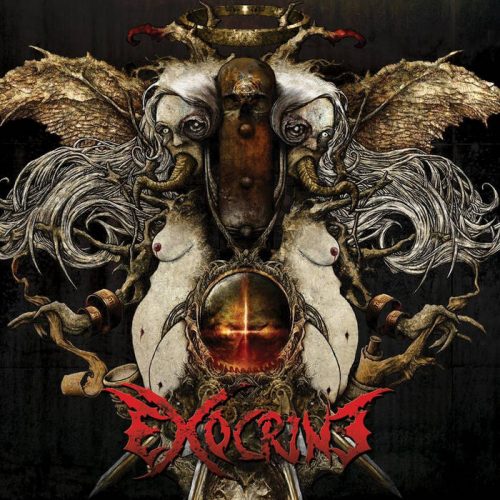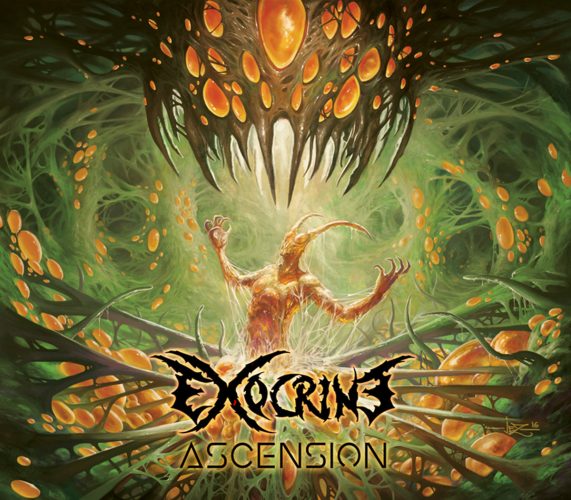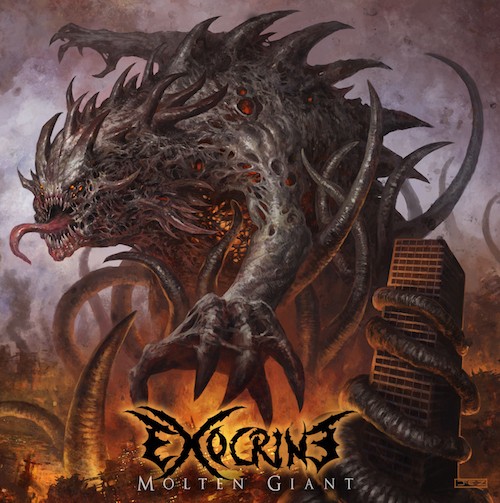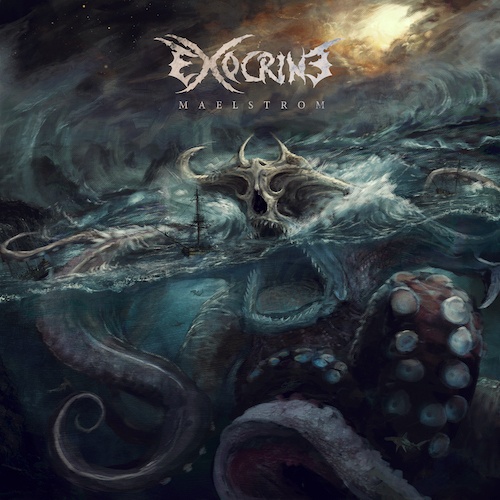
(Andy Synn has chosen to devote his SYNN REPORT for the month of June to the discography of the French band Exocrine, whose new album Maelstrom was released by Unique Leader on June 26th.)
Recommended for fans of: The Faceless, Gorod, Beneath the Massacre
The purpose of The Synn Report is, obviously, to give our readers an overview of the background and back-catalogue of whatever band I select each month.
One of the great things about this approach, of course, is that it allows all of us (myself included) to see just how the band in question has evolved over the course of their career.
In the case of French four-piece Exocrine the band’s evolution has led them to grow from some relatively humble beginnings into something far more titanic, and if 2018’s blazing Molten Giant didn’t convince you of the group’s tech-tastic lethality then perhaps their recently released fourth record, Maelstrom, will?
Before then, of course, there’s three other albums to sink your teeth into…

UNREAL EXISTENCE – 2015
On their debut album the French four-piece clearly had a lot of ideas, a lot of energy… basically they were a LOT in general… and even if they hadn’t yet quite worked out how to arrange everything into a truly unique pattern, their execution was already top-notch.
Opener “The Cycle Form”, for example, mixes the creative, dynamic riffage of bands like Gorod and Beyond Creation with the frantic intensity of Job For A Cowboy, Spawn of Possession, etc.
And while that may sound a little derivative on paper, the song’s swift progression from neck-wrecking heaviness and gargantuan gutturals to nimble-fingered melodic lead parts, and bouncy rhythmic hooks (the last minute or so in particular is ridiculously catchy) means that it’s ultimately a big success based off of the band’s obvious enthusiasm alone.
“World in Fire” ups the ante with a barrage of rapid-fire blastbeats and spiralling sci-fi guitar leads, after which “Medusa’s Embrace” keeps things intense with a short, sharp, shocking display of aggressive angularity that’s both edged with dissonance and tinged with melody.
Part 1 of the two-part “Voynich Manuscript” is all outlandish technical soloing and choppy, Soreption-esque riffage (along with some impressively elastic bass work), after which Part 2 simultaneously shows off the band’s proggier, more abstract side – showcasing several shades of Cynic, especially during the song’s early passages – and some of their heaviest riffage and punchiest percussion yet.
“Parasite” is three minutes of deathly distortion and twisted technicality (again, think a mind-meld of Gorod and Beneath the Massacre) which concludes in surprisingly moody and melodic style, before thrilling two-parter “The Blood for a Crown” delivers three minutes and forty-three seconds of gnarly riffage and growly vocals, followed by three minutes and nineteen seconds of proggy-yet-powerful Tech-Death shenanigans.
Final track “The Last Council” is, interestingly, far more focussed and much less flashy than a lot of the preceding album, putting the emphasis more on taut, rhythmic riff patterns and rolling grooves than shameless shreddery (though there’s still more than enough technical pizazz to go around), which leaves the band in an intriguing place where no-one is sure exactly what to expect from their next record.

ASCENSION – 2017
If there’s one thing you can tell straight away, once opener “Terra” kicks into gear in a frantic barrage of shifting, staccato blastbeats, tapping leads, and pneumatic, machine-like riffs, is that Exocrine have clearly found their focus on their second album.
Part-way between the inhuman technicality/brutality of Beneath the Massacre and the Cynic-inspired progginess of The Faceless, the band’s modus operanid on Ascension has been carefully refined to marry explosive bursts of robotic riff-craft and grisly gutturals with moments of moody melodic meditation.
And, rather than simply throwing these elements together in an overstuffed arrangement of parts, songs like “Alpha” and “The Fall” (the first two parts of the album’s first “chapter”) pack in fewer ideas per track when compared to the band’s previous album, but give them more room to breathe and evolve.
That’s not to say there’s not still a LOT going on here – “The Fall”, for example, moves from its opening, electro-ambient introduction, to a whirl of tangled technicality, building to a soaring solo, followed by some angular, hyper-aggressive riffage, a moody atmospheric interlude, and a visceral roaring conclusion – but Ascension certainly sounds more cohesive and immersive than its predecessor.
The album’s first chapter concludes with its heaviest track, “Cryogenisation”, which errs more towards the pure Death Metal side of things, with just a hint of technicality and eerie ambience, after which “Chapter II: The Ascension” kicks off with the sci-fi synths, chattering riffs, and gut-wrenching vocals of “Eternal Solitude” (which also features an impressively proggy, mostly instrumental, second half).
This is followed in quick succession by the gargantuan grooves and proggy indulgence of “Amber” (love that repeated piano motif right at the end) and the unexpectedly atmospheric (but still stunningly heavy) strains of “The Hive”, which moves back and forth between neck-wrecking Death Metal and atmospheric ambience over the course of just over four minutes.
The album’s final chapter (“Rebirth”) is shorter, but no less effective overall, beginning with the brooding instrumental of “Proceed”, before transitioning into the intense melodic momentum and meditative moodscaping of “Garden of Flesh”, which owes just as much to the Melodic and Progressive forms of Death Metal as it does the Tech side of things.
Concluding with jerky riffs, pounding percussion, and undulating bass-lines of “Empyre” (which also features some unexpectedly expanded vocals from singer Jordy Besse), Ascension sees the band carving out an evolutionary niche for themselves in the greater Tech Death ecosystem, while planting the seeds for bigger and better things to come.

MOLTEN GIANT – 2018
Molten Giant was the album where a lot of the wider Metal community began to sit up and take notice about what these French Tech-titans had to offer, and with good reason, as this is where the band really started to earn their “Progressive Technical Death Metal” moniker, tightening up their sound even further while also casting an eye towards future/further horizons.
The ominous, scene-setting intro to “Scorched Human Society” soon gives way to a tighter, heavier, and all-round more enraged version of the band we’ve come to know (and love), with both the vocals and the drums in particular erupting out of the speakers with more venom and vehemence than ever.
The band haven’t abandoned their more melodic inclinations of course, as the splashes of complex melody and touches of tension-building ambience demonstrate, but the dynamic distance between the band’s two sides – the proggy and the punishing – has been exaggerated even further.
“Hayato”, for example, melds shimmering sci-fi synths and frantic-yet-fluid lead patterns with some seriously heavy, piston-powered riffing and hypnotically hammering rhythmic hooks, while “Backdraft” might just be the catchiest song the band have ever written, all swirling synths, sweeping leads, and high-voltage, high-tech guitar work (with just a dash of bestial brutality for good measure).
The title-track is the album’s heaviest cut yet, whose juddering, jackhammer riffing recalls the best of Soreption or Decapitated, interspersed here and there with some seriously expressive solo work (whoever said Tech Death can’t do emotion?), after which “Flamewalkers” doubles-down on the angular grooves and extravagant, proggy melodies in equal measure.
Semi-penultimate track (not counting synthstrumental interlude “Behind the Wall”) is absolutely full of surprises – hooky enough to keep your head bobbing and your fingers flexing in involuntary air-guitar, but unafraid to take a sudden left turn into stranger, proggier waters, before bringing the hammer down even harder – after which the grand finale of “Shape of New World” uses its ambitious eight minute run time to give the band’s progressive side even more room too spread its wings, displaying shades of artsy atmosphere reminiscent of Beyond Creation and/or Rivers of Nihil, without neglecting to deliver all the requisite bombastic brutality along the way!

MAELSTROM – 2020
On their fourth album the band’s evolution has carried them into even proggier waters – yes, those are indeed trumpets you hear – although they still retain a formidable flair for dropping bombs of devastatingly dense, pinpoint precise riffage, as the opening strains of “Maelstrom” swiftly demonstrate.
You’ll notice right away that the production is cleaner and clearer this time around, but still satisfyingly meaty (though if you’re looking for traditional Death Metal dirt you might want to look elsewhere), which both increases the music’s intensity and impact while also allowing the band’s more atmospheric ambitions to ebb and swell to fill every moody nook and cranny.
Another thing you’ll notice is that the newfound grandeur unveiled during certain moments – the subtle clean-sung embellishments found during “Maelstrom”, the soaring central chorus of “The Kraken”, the pseudo-symphonic, viscerally technical assault of “Wall of Water” – leans more towards the melodramatic menace of Fleshgod Apocalypse than the indulgent proggery of The Faceless, which is an interesting and unexpected twist to the existing Exocrine formula (but one which definitely works).
And then, of course, there’s the trumpets, which on paper sound like a ridiculous idea, but which add an unsettling, noir-ish atmosphere whenever they rear their brassy heads (such as at the end of “Wall of Water” or during the wave-tossed conclusion of “The Wreck”).
Exocrine also wisely choose not to overplay their hand with this particular gimmick, leaving tracks like “Orbital Station” and “Starvation Project” – two of the album’s heaviest and hardest-hitting numbers – to stand or fall based purely upon the strength of their earthshaking riffs and frantic technicality alone.
The band really push the boat out (aquatic/nautical pun intended) on the last two songs, throwing in some seriously dizzying twists and turns during the technical rollercoaster ride of “The Chosen One”, before bringing the record to a fittingly powerful and proggy end with “Galactic Gods”, where the quartet fully and fluidly interweave their shape-shifting synths and smokey trumpet parts into the metallic maelstrom with scintillating results.
Take note – Exocrine are well on their way to becoming an absolute monster of a band, and there’s a good chance that, a little further down the line, we’ll be looking back at this album as the point where they began to truly realise and explore their full potential.

I loved Exocrine’s disc prior to their newest. I picked it up on Israel’s recommendation since I do believe he handled the review for us. The latest is just as good to me but honestly, that first brass instrument hit made me smile because the sheer gall to throw that in, partially as a segue into the next song and then later as part of the song itself, on top of the whirling clusterfuck of everything else the band are up to on Maelstrom, is massive.
Oh cool, thanks for posting this. I’ve just been listening to Exocrine a lot. I only discovered them last year- their 2018 record Molten Giant. That record has become a regular listen. I wasnt aware of their earlier stuff yet. The new one…well I’ll have to get it and let it grow on me. These guys are bursting with ideas.